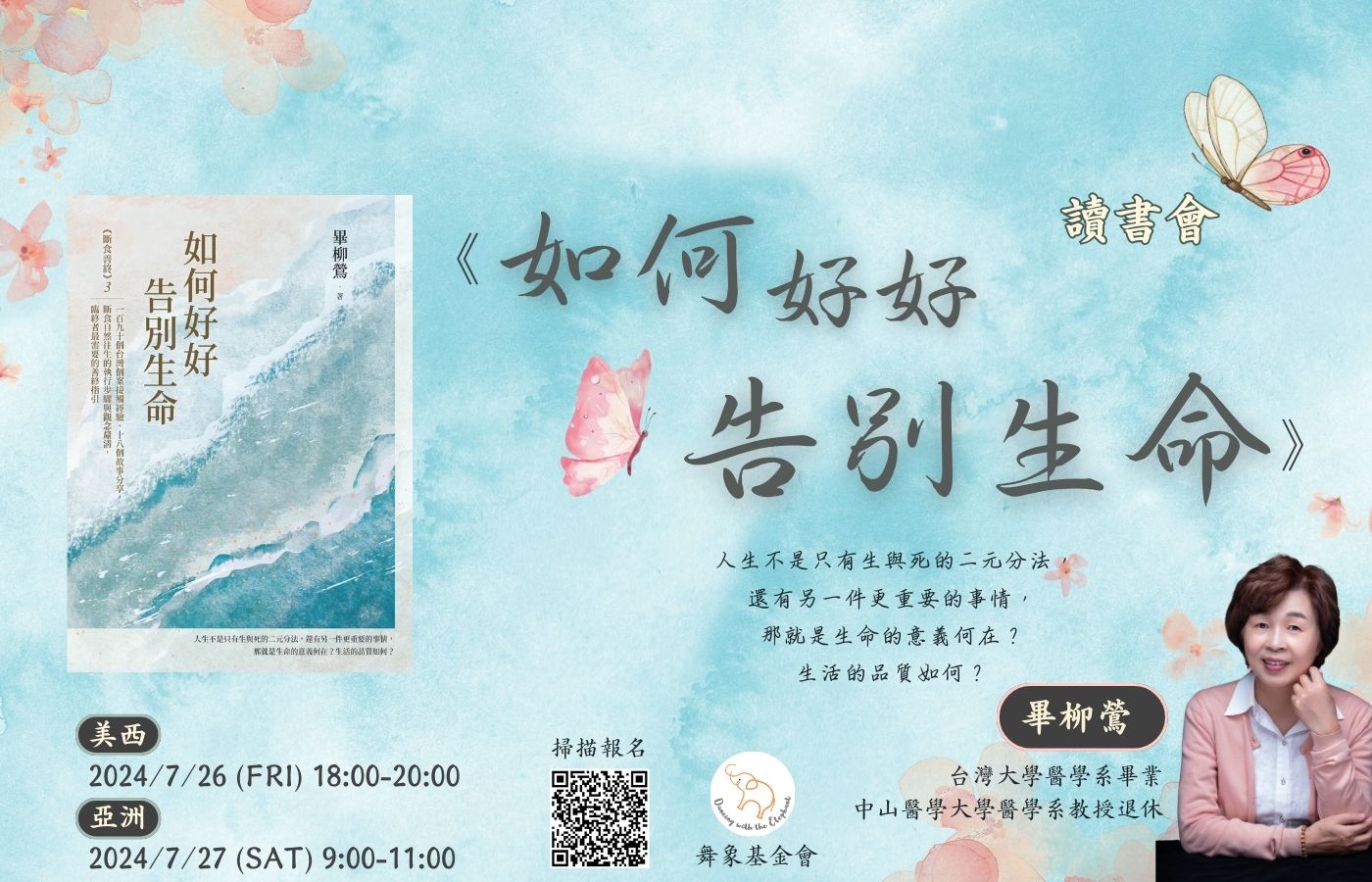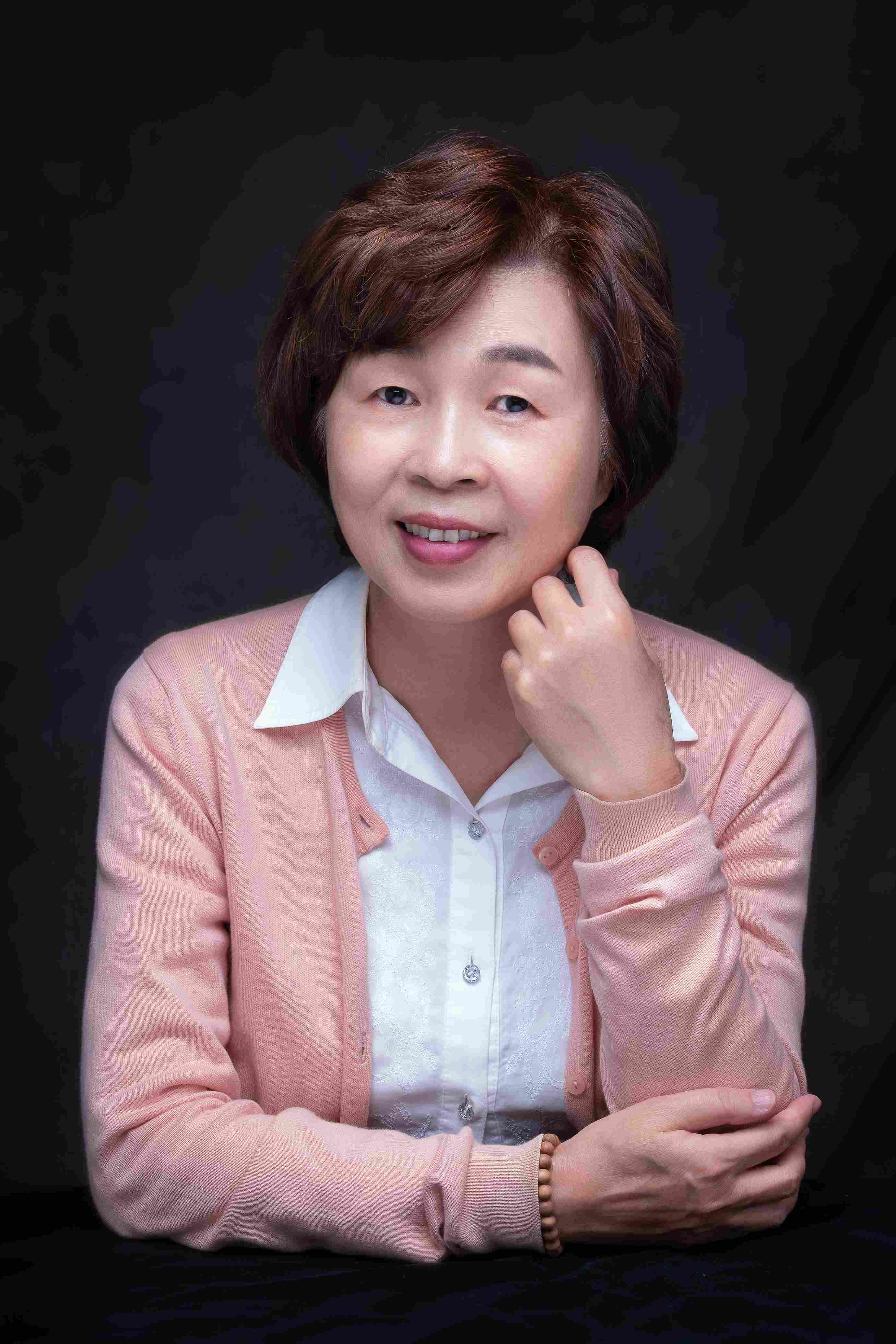

 美西(GMT -7) 2024/07/26 18:00-20:00
美西(GMT -7) 2024/07/26 18:00-20:00 
論語先進篇中說:「不知生,焉知死。」目前一般的解讀是,孔子要我們積極專注的過好生時的日子,不要常常憂慮、恐懼死亡,也就是將注意力放在當下。
莊子呢?莊子在《至樂》說到生死是四季運行的自然常態,是宇宙大流行的常態。人最初只是宇宙中的一絲氣息,氣息化成了形體而後有了生命。死亡只是生命重新返回了宇宙中,是一種解脫與安適。
佛家呢?禪宗認為,「生也未曾生,死也未曾死」,死亡是色身的毀朽,法身慧命沒有生死。所以生命是永恆的,色身的死亡只是自然現象,如花開花落。
這些是儒釋道三家的生死觀,但是我們不是哲人,遇到生死大事不免悲痛恐懼,不知如何才能放下,也不知道人生的最後一程應當怎麼過度。而古聖先賢,也從未告訴過我們應該如何計畫與執行人生的畢業旅行。
面對親人的離去或即將離去,有的是不捨的感情,想要將親人留存世間的執著。面對自己的生命的逝去,同樣的是不捨世上的親人以及對死亡過程的未知恐懼。以上這些都會使得人生最後的旅程出現各種無謂的拉扯、挽留,使得這一程走得無比艱難。除此之外,更有著我能為自己做些什麼?如何能夠清清楚楚地為自己做出最後一程的安排與計劃,而非身不由己的任人擺佈。
畢柳鶯醫師在【善終三部曲】的第三部《如何好好告別生命》一書中,透過觀念釐清、個案故事、案例分析以及清晰的步驟指引,幫助大家為自己擬定人生畢業旅行攻略。身邊的親友們,也可以藉著這詳盡的指引手冊與清晰的觀念引導,與當事人共同擬定這份攻略以及行前準備,譜繪美善的人生終章的畫卷。

【講師簡介】
畢柳鶯/ Liu-Ing Bih
台灣大學醫學系畢業,台大醫院復健科住院醫師訓練。曾任台中市立復健醫院院長,中山醫學大學醫學系教授退休,目前任職衛福部復健科資深教學醫師。小學時就感受到男女不公平,人類社會弱肉強食,喜好打抱不平。擔任復健科醫師是我人生最正確的選擇,養成不是只看見疾病而是全人照顧的素養。感謝所有我服務過的病人及家屬,他們的脆弱、受苦、堅強與韌性,給了我許多的啟發與力量。也感謝復健團隊中所有成員無私熱情的協助。
喜歡藝術、旅遊、攝影與閱讀,2009年起透過部落格「阿畢的天空」分享心得,發表500多篇文章。著有「醫步醫腳印」。

How to Gracefully Bid Farewell to Life: A New Book Seminar (single session)
Death’s taboo weaves its way through all cultures, near and far, ancient and modern. The German philosopher Heidegger said, “Being towards death,” implying that with each passing day, we draw closer to death. Every person, including everyone we love, will eventually face death and bid farewell to the world. Yet, like ostriches, the general public often avoids and refuses to contemplate death, pretending it does not exist, thinking that days can continue endlessly as they are. Apart from philosophers, religious figures, and a handful of advocates for life awareness, the vast majority of people shy away from discussing death. However, the impermanence of life often arrives earlier than expected. At such times, immediate reactions include “How could it be me? I don’t want to die!” or “My loved one can’t die!” Hence, people are willing to pay any price to prolong life. Doctors, dedicated to saving lives, enter their profession to learn all standardized procedures to prevent patients from dying. Even when faced with patients on the brink of death or those battling terminal cancer, they instinctively employ every possible measure to defy the inevitable.
However, life has its limits, and medicine has its boundaries. When a patient’s body becomes the battleground for doctors fighting against death, it is the patient who suffers and the family who grieves. Under the torment of ineffective medical interventions, 70% of people die in cold hospital rooms or intensive care units. People lose the opportunity to pass away peacefully at home, and families miss the chance to properly accompany their loved ones and say goodbye, resulting in long-term sorrow and regret over misguided medical decisions.
The taboo of death is deeply rooted in Chinese society, forming a cultural framework and myth where people and the medical community feel compelled to save patients at all costs After the advancement of medical technology in the 1960s, coupled with the implementation of health insurance after 1995, in the past few decades, too many people who should have died naturally have been held hostage by medical technology, living only as shells, dragging down their families, health insurance, and society. This is a completely unethical anomaly. These patients are forced to use respirators and force-fed, and many ineffective medical treatments are inflicted on them, causing them unbearable suffering. An aging society is coming, if families do not awaken to this issue and the medical community does not change its style, this kind of unethical incident will only increase, and the price paid by individuals, families, and society will only become higher and higher. From this perspective, can we really call ourselves a progressive nation that values human rights?
Western countries have also experienced this process. In the 1980s and 1990s, some families fought hard to have ventilators removed from bedridden relatives, with cases reaching the Supreme Court and attracting national attention, sparking intense debate. Gradually, the medical community began to change its approach. For example, in the United States, the United Kingdom, Canada, and Germany, most patients for whom treatment is ineffective now have their life-support systems withdrawn in intensive care units. Elderly patients in the terminal stages of severe illness are not intubated or subjected to futile treatments. The book “Modern Death: How Medicine Changed the End of Life” offers thought-provoking discussions on the evolution of modern medical technology, its positive and negative impacts, and the gradual changes in medical practices. The evolution process abroad serves as our best reference. We are already two to three decades behind, but as long as we are willing to think, self-reflect, and change, Taiwan, which claims to be the most democratic and open-minded country in Asia, certainly has the strength to change its mindset and becomes a nation that values the right to a dignified death.
The above is an excerpt from an article. For the complete article, please refer to the source >>> Preface: Death Taboos and the Meaning of Life
https://bee1955.blogspot.com/2024/06/blog-post.html
Liu-Ing Bih
【Lecturer Profile】
Dr. Liu graduated from the National Taiwan University School of Medicine and trained as a resident physician in the Department of Physical Therapy and Rehabilitation at the National Taiwan University Hospital. She used to be the Dean of Taichung Municipal Rehabilitation Hospital and is a retired professor at the Chung Shan Medical University Hospital. She is currently a senior medical professor at the Department of Physical Therapy and Rehabilitation of the TW Ministry of Health and Welfare. Since she was in elementary school, she felt gender inequality. She also felt that the weak are prey for the strong in the human world, and she endeavors to fight against injustice. Being a rehabilitation physician was the greatest choice she made in her life. She learnt to develop an ability to not simply focus on how to combat an illness but to treat and care for a patient as a whole person holistically. She is grateful for all her patients and their families that she has served. Their vulnerability, suffering, grit, and resilience have given her a lot of inspiration and strength. She also wants to express her gratitude to all the members of the rehabilitation team for their selfless and enthusiastic assistance.
Dr. Liu likes art, travel, photography and reading. Since 2009, she has shared her experience through her blog “A Bi’s Sky” (http://bee1955.blogspot.com/) and published more than 500 articles. She is also the author of “Medical Steps and Medical Footprints” A literal translation of Book Title)
【Education】
Graduated from National Taiwan University School of Medicine
Advanced Studies at New York University Langone Health (Affiliated Hospital) and JAPAN National Rehabilitation Center
Dean of Taichung Municipal Rehabilitation Hospital
Professor, Department of Physical Therapy and Rehabilitation of the TW Ministry of Health and Welfare
【Current Position】
Senior Medical Professor, Department of Rehabilitation, Taichung Hospital, Ministry of Health and Welfare
線上直播注意事項
(線上直播注意事項不適用於【實體活動、實體工作坊】,實體活動、工作坊請依各活動之專屬規範為準。)
一、舞象官網說明
為服務世界各地學員,舞象已成立兩個官網,提供學員擇一使用,一人一帳號須遵守舞象規範。
1.國際官網–官網名稱:舞象基金會
主要服務北美、歐洲、南美、台灣、馬來西亞、新加坡、印尼、日本等海外地區;國際官網系統設定時間以美西時間為主,報名時請留意個人所在地的時區,避免錯過課程。
2.大陸官網–舞象文化
主要服務大陸內地;大陸官網系統設定時間以亞洲時間為主,報名時請留意個人所在地的時區,避免錯過課程。
二、線上直播課程報名相關規定
1.報名時勾選提交【同意書】,表示已充分閱讀、理解,並同意遵守所有規範與相關規定。
2.兩個官網的付費課程將在有效期內提供影片回放觀看,或未來做成錄影回放於舞象官網販售,舞象保有活動、課程影片版權所有權。
3.錄影回放販售影片內容,可能包含課程中學員的個人分享及講師與學員對話;報名舞象課程請務必知悉,舞象保有活動、課程影片處理權及版權所有權。
4.舞象新增影音系列、音頻系列相關規範,請參閱課程說明,舞象保有影音、音頻版權所有權。
5.報名繳費後課程尚未開課前,因個人原因無法參與課程者,請依舞象規定申請辦理取消;課程開課後將不提供取消退費服務;其他費用規範請參閱官網常見問題說明。。
6.舞象保留取消或變更開課時間的權利。若課程因故取消,舞象將全額退還已繳納費用。請在繳費前仔細閱讀並理解相關條款,繳費行為即表示已閱讀並充分接受相關條款。
7.請閱讀【線上課程注意事項】或【實體/線下活動規則】繳費即表示本人同意並遵守相關規定。
8.最終解釋權歸舞象基金會「Dancing with the Elephant」所有,舞象保留隨時修正、補充說明、暫停或取消辦法之權利。
三、線上直播會議室 ZOOM ID查詢
線上會議室 ID訂於開課前三天在官網課程頁面公布,請自行登入報名課程查詢
舞象基金會官網:https://www.dancing-with-the-elephant.com/my-account/?login
會議室ID查詢四步驟:
👉🏻登入會員專區→ 我的課程→ 查看課程 (會議室ID課前三天公布,若公布時間未到請耐心等候)
四、付費影片回放、講義查詢
五、影片回放有效期限
六、其他資訊